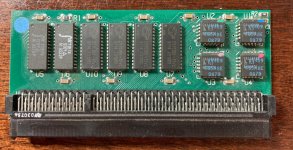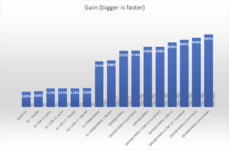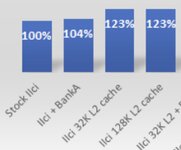For those with envy for the IIci 128KB cache and Quadra FastCache, I ran some real-world-ish performance tests.
TLDR; Very little performance improvement from either 128KB memory caches.
System 7.5.5. Disk cache 128KB (except on IIci where BankA=larger disk cache to fill video memory and force programs to run in BankB). All computers with 64MB RAM or more. Tests run on external MacSD. 640x480 8-bit color. Appletalk off.
I complied a commercial C program using Metrowerks CodeWarrior 5. It consisted of 81 files with a total of 164,000 lines of code. So, this is a processor/SCSI/memory test, not a video test.
View attachment 43548
All results compared to stock (no cache) Macintosh IIci.
First real boost is the 32KB cache card.
Next real boost is a IIci 68040 card. This is massive.
Next boost is an actual 68040 computer (Quadra 630/605/650) running at 33 MHz.
If the Quadra Cache software is not loaded, the card does not activate and makes no improvement.
With the software loaded, we only get a 7% improvement (428%/398%) from the 128KB Quadra cache card. Norton System Info test results were almost nothing.
With the PowerMath and ROM features of the software enabled, we still only get an 11% improvement from the 128KB Quadra cache card.
Moving two resistors on the Quadra 630 provides better results due to overclock to 40 MHz.
Replacing the crystal on the Quadra 650 provides the best results due to the overclock to 40 MHz. In fact, it scored better than the Quadra 840AV in Norton System Info 3.53.
The Quadra cache card did not work with the overclock. So, no results are shown for that.
In summary, expect almost no boost from a 128KB IIci cache card compared to 32KB. Expect maybe a 10% boost in certain cases for the 128KB Quadra cache card, whereas a crystal swap will give you 17%.
Even if you ignore overclocking, the Macintosh mid-range line had a 4x speed improvement in 4 years.




